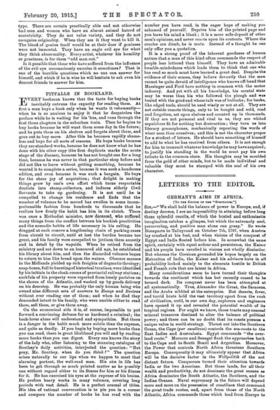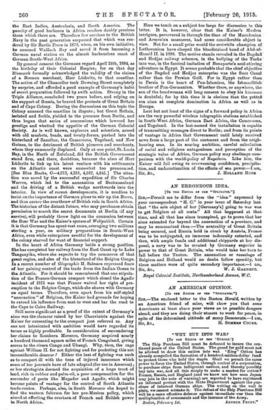LETTERS TO THE EDITOR.
GERMANY'S AIMS IN AFRICA.
roe as Emma OF sou "SezorAros...]
Solt,—" We shall held the balance of power in Europe, and, if destiny decrees, I see no impossibility in attaining before long those splendid results, of which the heated and enthusiastic imagination catches a glimpse, but which the extremely cool, persevering, and positive man alone can grasp." So wrote Bonaparte to Talleyrand on October 7th, 1797, when Austria lay crushed at his feet, and when visions of the conquest of Egypt and India floated before him. In somewhat the same Spirit, certainly with equal ardour and persistence, the Kaiser and his people have revelled in visions not wholly dissimilar. But whereas the Corsican grounded his hopes largely on the Mahrattas of India, the Kaiser and his advisers have hi all probability looked mainly to the elements hostile to British and French rule that are latent in Africa.
Many considerations seem to have turned their thoughts towards the continent which has but recently ceased to be termed dark. Its conquest never has been attempted at all systematically. True, Alexander the Great, the Saracens, and the Arabs nibbled at the enterprise. But deserts, fever, and torrid heats held the vest territory apart from the rush of civilization, until, in our own day, explorers and engineers have opened it up and revealed the potential wealth of its tropical regions. For aught we know, those tracts may conceal mineral treasures destined to alter the balance of political power ; and there can be no doubt that its coasts possess a unique value in world-strategy. Thrust out into the Southern Ocean, the Cape (par excellence) controls the sea-route to the East Indies and Australasia. Egypt commands "the over- land route." Morocco and Senegal flank the approaches both to the Cape and to South Brazil and Argentina. Moreover, the Power that controls North Africa threatens Southern Europe. Consequently it may ultimately appear that Africa will be the decisive factor in the Weltpolitik of the not distant future. Conquerors turned their attention towards India or the two Americas. But those lands, for all their wealth and productivity, do not dominate the great oceans a. Africa dominates the South Atlantic, the Southern, and the Indian Oceans. Naval supremacy in the future will depend more and more on the possession of coastlines that command the great trade routes, and, apart from those of the North Atlantic, Africa commands those which lead from Europe to
the East Indies, Australasia, and South America. The paucity of good harbours in Africa renders doubly precious those which there are. Therefore few services to the British Navy in the past generation surpassed that which was ren- dered by Sir Bartle Frere in 1878, when, on his own initiative, be annexed Walfisch Bay and saved it from becoming a German naval station on the almost harbourless coast of German South-West Africa.
By general consent the Germane regard April 24th, 1884, as the birthday of their Colonial Empire; for on that day Bismarck formally acknowledged the validity of the claims of a Bremen merchant, Herr Liideritz, to that coastline. The action of the Chancellor took Downing Street completely by surprise, and afforded a good example of Germany's habit of secret preparation followed by swift action. Strong in the Triple Alliance, concluded two years before, and relying on the support of Russia, he braved the protests of Great Britain and of Cape Colony. During the discussions on this topic the Colony annexed the coastline in dispute ; but Great Britain, isolated and feeble, yielded to the pressure from Berlin, and thus began that series of concessions which lowered her prestige and whetted the appetite of the German Colonial Society. As is well known, explorers and scientists, armed with old muskets, beads, and treaty-forms, pushed into the hinterland of Zanzibar, the Cameroons, Togoland, and New Guinea, to the detriment of British pioneers and merchants, whom they summarily displaced. Only at one point, St. Lucia Bay, in the North of Zululand, did the British Government stand firm, and there, doubtless, because the aims of Herr Luderitz to link up his latest venture with his settlements on the Atlantic coast were somewhat too prononnced. [See Blue Books, C-4,213, 4,251, 4,587, 4,645.] The situa- tion was saved by the successful expedition of Sir Charles Warren, which led to the annexation of Bechuanaland and the driving of a British wedge northwards into the interior. In view of recent developments, it is needless to insist on the importance of German plans to stir up.the Boers, and thus assure the overthrow of British rule in South Africa. The historian of the distant future, who may perchance obtain permission to search the secret documents at Berlin (if any survive), will probably throw light on the connexion between the Boer War and the Kaiser's system of Wellpolitik. Certain it is that Germany has spent vast sums, averaging two millions sterling a year, on military preparations in South-West Africa, even while enterprises needful for the development of the colony starved for want of financial support.
In the heart of Africa Germany holds a strong position. She has completed her railway from the East Coast up to Lake Tanganyika, where she expects to tap the commerce of that great region, and also of the hinterland of the Belgian Congo. In a recent number of Geographic H. Salesses expressed fears of her gaining control of the trade from the Indian Ocean to the Atlantic. For it should be remembered that one stipula- tion of the Franco-German compact which closed the Agadir incident of 1911 was that France waived her right of pre- emption to the Belgian Congo, which she shares with Germany on equal terms. Therefore, even apart from his self-styled "annexation" of Belgium, the Kaiser had grounds for hoping to extend his influence from east to west and bar the road to the Cape to Cairo Railway.
Still more significant as a proof of the extent of Germany's aims was the clamour raised by her Chauvinists against the Kaiser for consenting to the compact just referred to. Any one not intoxicated with ambition would have regarded its terms as highly profitable. In consideration of surrendering her claims to Southern Morocco, Germany acquired nearly a hundred thousand square miles of French Congoland, giving access to the rivers Congo and Ubangi. Why, then, the rage against William II. for not fighting and for pocketing this not inconsiderable dowser ? Either the lust of fighting was such as to comport ill with the tone of injured innocence which some of her journals have of late adopted (for use in America); or her strategists deemed the acquisition of a huge tract of land, rich in rubber and pal es-oil, a poor compensation for the surrender of ports like Mogador and Agadir, which might become points of vantage for the control of South Atlantis trade-routes. Perhaps, also, in South Morocco she hoped to find the western fulcrum. for her pro-Moslem policy, which aimed at effecting the overturn of French and British power is North Africa. Here we touch on a subject too large for discussion in this letter. It is, however, clear that the Kaiser's Modem intrigues, persevered in through the time of the Macedonian and Armenian massacres, bad some considerable object in view. Not for a small prize would the erstwhile champion of Lutheranism have clasped the bloodstained band of Abd-ul- Humid If. in 1898. The motive stands revealed in the Bagdad and Hedjaz railway schemes, in the bullying of the Turks into war, in the farcical imitation of Bonaparte'. soul-stirring adventure in Egypt. It seems probable that the chief objective of the Bagdad and Beak'z enterprise was the Suez Canal rather than the Persian Gulf. For in Egypt rather than in Persia is the heart of Pan-Islamism, the Ishmaelitish brother of Pan-Germanism. Whether there, or anywhere, the son of the bondwoman will long consent to obey his kinsman is doubtful; for by this time it is obvious that the petted- son aims at complete domination in Africa as well as in Europe.
Last but not least of the signs of a forward policy in Africa are the very powerful wireless telegraphic stations established in South-West Africa, German East Africa, the Cameroon, and Togoland. In the last-named the installation is capable of transmitting messages direct to Berlin; and from its points of vantage in Africa that Government until lately received news from a large part of the continent and from the neigh- bouring seas. In its soaring ambition, careful calculation of racial and religious antagonisms, and perception of the strategic value of Africa. German policy may challenge com- parison with the world-policy of Napoleon. Like him, the Kaiser will fail owing to overweening confidence, precipita, lion, and underestimation of the effects of sea power.—I am,







































 Previous page
Previous page